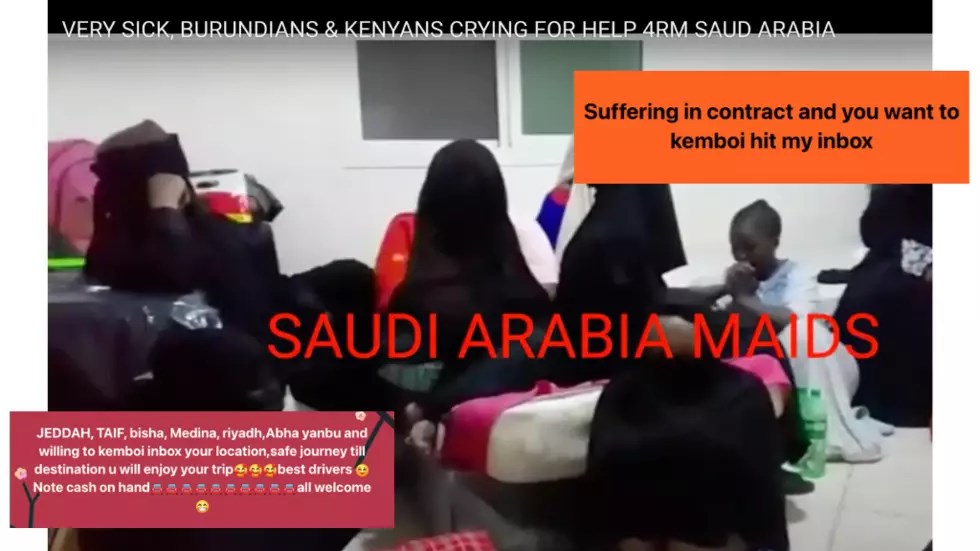Meet the 'dalalas': Disguised in aid, they prey on home workers in KSA
A new report by The France 24 Observers exposes the dalalas, a group of people claiming to offer help to desperate women trying to flee their employers, yet they end up preying on them.
-

Screenshot of a video showing African domestic workers in Saudi Arabia and comments from dalalas on Facebook (Debra Nyanchoka/Facebook)
Many foreign domestic workers in Saudi Arabia are forced to work in deplorable conditions, often under the supervision of abusive employers. They are, moreover, imprisoned by a system that connects their working privileges in the country to the company.
A new report by The France 24 Observers shed the light on the "dalalas"; middlemen who patrol Facebook, offering desperate women assistance in fleeing their employers in search of better jobs and working circumstances. However, it turns out that under the guise of offering help, their real aim is to prey on the most defenseless.
A video uploaded to YouTube in late 2022 shows a group of veiled ladies standing in a room pleading for assistance, with the majority of them speaking Swahili. According to one of the women in the video, they are domestic servants who have become stranded in Jeddah, Saudi Arabia, after fleeing their abusive employers.
Video Credit: The France 24 Observers
"Some of us are very sick and can't help ourselves, we have some who have gone mad but we dont get any help. In case one of us is sick there is no help [...] Some of us have been for six months without work, we have waited and we are tired," one of the victims said.
While workers can find employment in these arrangements that allow them to send money back home, deceitful sponsors can exploit their laborers who often have no other legal recourse. Stories of workers having their passports seized, working non-stop without breaks, and not being properly paid have long overshadowed Saudi Arabia.
Saudi Arabia still requires workers to get their employers' approval for leaving the country. Meanwhile, maids and domestic workers can find themselves even more at risk by living alone with families in private homes.
Many African women who migrate to the Gulf States to work as domestic workers end up in deplorable working circumstances. One reason for this is the problematic "kafala" system, which requires foreign workers to be sponsored by a local employer, tying their legal position in the country to one individual or entity. In many circumstances, the employees' passports are seized, thus gaining complete control over their lives.
Saudi Arabia allegedly made some system adjustments in March 2021, but the majority of the most vulnerable, including domestic employees, still suffer from horrible abuses, according to the Organization Migrants Rights, which defends the rights of workers in the Gulf States.
Hence, if you work for an abusive boss, you have two choices. Remain and complete your legal deal, or you can flee and become a "kemboi", which might be just as hazardous.
In Kenya, fleeing women are known as "kembois"; or undocumented domestic workers who have abandoned their "lawful" employers in the Gulf States.
The dubbed name comes from Kenyan runner Ezekiel Kemboi, winner of the 3000-meter steeplechase at four World Championships and two Olympics.
Survivor turned advocate
Video Credit: The France 24 Observers
In this video, Debra Nyanchoka, a Kenyan lady who worked as a domestic worker in Saudi Arabia for two years, cautions women considering leaving their employer about the persons who may try to prey on them in this video by The France 24 Observers.
"Your passport is confiscated by your boss and all official documents. They keep them for you until you finish your contract. So if you run away, you leave without papers and cannot access any medical facility. But the end result become that you lose basic protection from the government of whichever country that you are in, because now, you are on the loose," she was quoted as saying by The Observers.
Go from bad to worse
Debra Nyanchoka discusses these intermediaries and their reasons in another video on her YouTube channel.
Video Credit: The France 24 Observers
"Dalala is somebody who was once a house maid. When you cry online about your situation at your employers’ house, a dalala might see your message and they will contact you. They say they will save you, and you become a hot commodity to a broker when you run away. So they will help you run away first. They send you a taxi to pick you up from your workplace and bring you to your next location. At that moment, you become business to those dalalas. They will then connect you to get jobs paid under the table. And they will receive a payment for offering your services to bosses who cannot afford to labour from outside of the country. [...] without kembois, the dalalas are nothing. So when someone encourages you to run away, ask yourself: why is this person is trying to make me run away fom my workplace?,” she divulged.
Indeed, there are several Facebook posts by dalalas advertising their services, just waiting for someone desperate and needy enough to seek their assistance.
The dalalas, who promise security and better working conditions, offer to pick up a domestic worker who wants to leave her employer and deliver her to a safe location in exchange for cash, as demonstrated in this Facebook photo.
-

This post is offering “help” to vulnerable domestic workers who want to leave their employers in different towns in Saudi Arabia. Note that the post asks to be paid in cash. ( Facebook)
Recounting sexual abuse
Mary, a Kenyan lady who moved to Saudi Arabia to work as a domestic servant was quoted saying by The France 24 Observers that living with her legal employer was difficult, "Life was not easy. In my boss's house, I could go hungry. More work, less food, and less rest."
Mary decided to share her horrible experiences in a Facebook group. A woman who noticed her post offered to assist Mary, offering her a better life with less labor and more freedom.
The woman stated that she would assist Mary for 3,500 Saudi riyals (equivalent to 885 euros). "I provided my location with her, and she dispatched a driver who picked me up when I went to toss rubbish beside the road," Mary decided to take the woman's offer and gave the address to her.
The driver dropped Mary off at the home of this woman, who turned out to be a dalala.
Mary lacked the funds to compensate the woman for her escape. So the dalala ordered her "to accept whatever job available to acquire some money and pay for transportation and driver. I agreed, and she warned me to be prepared for anything. Suddenly she arrived, accompanied by two males. They were basically using me as a sex toy. That's how they got the money they were after from me."
Mary refused to speak about how she managed to flee and return to Kenya.
According to the NGO Migrants Rights, dalalas are frequently from the same nation as the domestic workers they prey on. They are sometimes previously domestic workers themselves. In other circumstances, dalalas pose as employees of a "recruitment agency".
"They can and do exploit co-nationals. But they exist because there are needs not being met by the state. Domestic workers who want to change employers due to abuse, non-payment, or whatever reason, often have no one else to turn to – under the sponsorship system, all migrant workers can encounter difficulties in changing employers, but domestic workers face the greatest restrictions. Brokers can and do take advantage of this vulnerability, but the source of the problem is the lack of labour protections for domestic workers. In local (origin and destination country) media reporting, you will often see government officials blaming women for leaving their employers and being lured by these brokers, without really acknowledging why people have to leave in the first place," said Rima Kalush, the spokesperson for Migrant Rights.
Yvonne Ndege, the IOM's East Africa spokesperson, said, "It is difficult for the Kenyan government to track down the migrants because runaways rarely contact the embassy to inform on their whereabouts."
Read more: AP: Facebook Papers Reveal Company Knew of Maid Abuse, Failed to Act

 8 Min Read
8 Min Read










